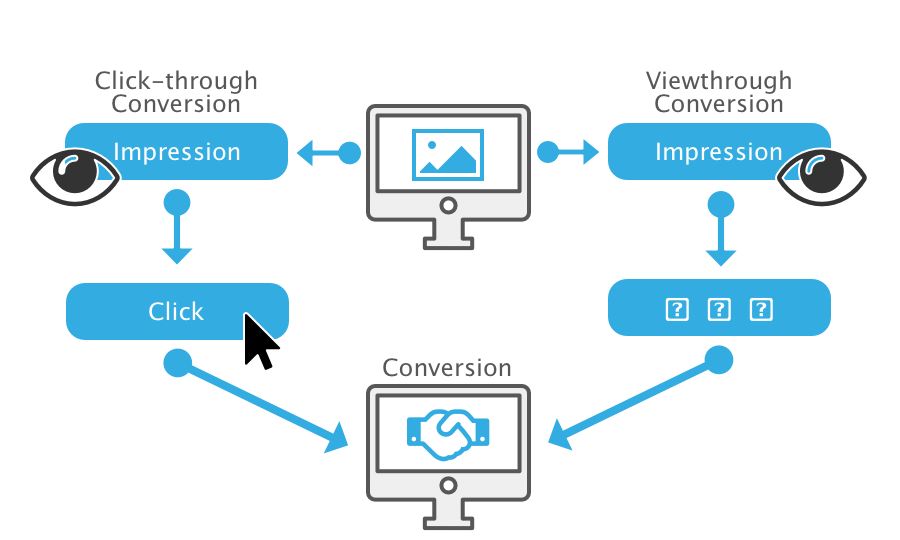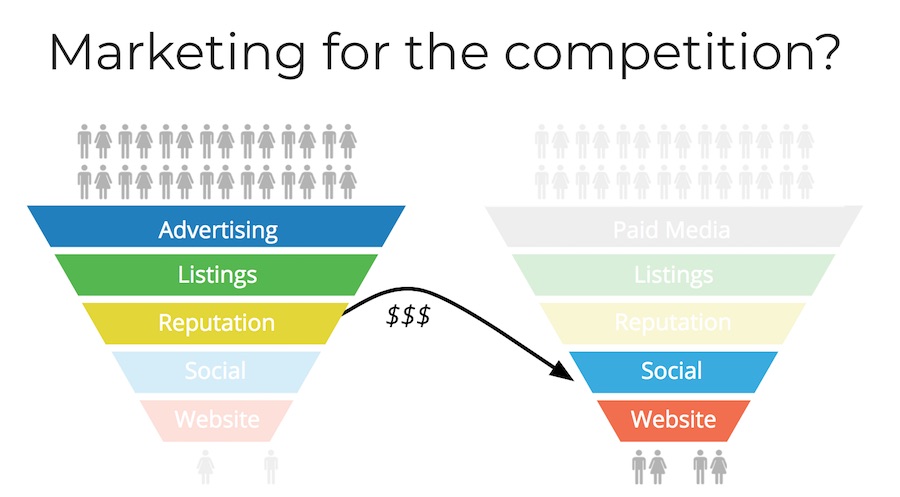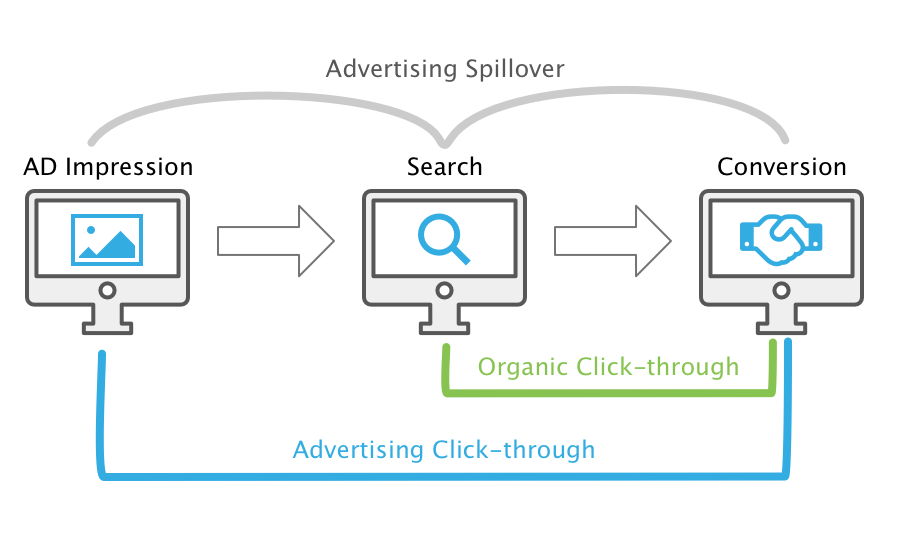How Digital Advertising Spillover Affects your Organic SEO
You may have experienced advertising spillover on campaigns that you've run, that your competitors are running, or maybe you've even been the spillover without ever knowing it!
In this post we'll examine different types of advertising spillover, why people choose to ignore it and what it means for your Organic SEO.
To get started, let's talk about social spillover and view-through conversions.
Table of Contents
- What is social spillover?
- What are view-through conversions?
- What does advertising spillover mean for your business?
- How does advertising spillover affect your channel attribution?
- How does advertising spillover affect your SEO?
- What should you do about advertising spillover?
- What you need to know about funnel hijacking
- How much value is generated from advertising spillover and funnel hijacking?
- How does spillover affect the way you sell advertising?
- Conclusion
What are view-through conversions?
View-through conversions are when a user sees a display ad, but later converts through a different source. Typically view-through conversions only refer to conversions related to Display Network impressions. Adwords has view-through conversion tracking functionality you can access your ads.
View-through conversions are pretty much identical to social spillover, but one refers to display ads on Google, while another is on social channels.

Google and Facebook offer solutions for tracking view-through conversions but they're notoriously greedy. Unsurprisingly the vast majority of us have been exposed to ads and then converted. Ads are everywhere but there is no way to attribute this back. Despite the fact that we can get all sorts of metrics in our dashboards they end being something not everyone is happy with.
What does advertising spillover mean for your business?
In general, the concepts of social spillover and view-throughs are very similar to how billboards, television, or radio ads work. In all three instances, an ad is impressed upon you that resonates somehow, and then a sort of mental squirrel stashes that ad nugget away to be retrieved in the cold winter of boredom—at which point you grab your phone and Google that thing and voila! We have spillover as all the nuts roll out onto the floor.
Recently I had an opportunity to read Chaos Monkeys by Antonio García Martínez and came across this technical parable:
Have you ever driven on a highway and seen those roadside billboards? You know: McDonald's, Four mile on right! Even if we don't consciously process the image assaulting our retinas, our subconscious, that cradle of desires both holy and unholy, has registered it.
...
In the online world, seeing that advance sign is known as a viewthrough: the physical viewing of an ad, but with no resulting immediate action. Turning off the highway when you see the golden arches is known as a clickthrough: an immediate action following a marketing prompt.
He continues on to gloss over the attribution challenge (as anyone who already has our advertising spend would) but you get the general idea. Viewthroughs, social spillover, advertising spillover - whatever you prefer to call them - they're not new challenges that marketers face.
Unfortunately we can't rely on Facebook and Google to tell us what kind of value to expect from Advertising Spillover. They've solved a lot of problems we've faced in connecting to our prospects but this is one area that they're biased.
How does advertising spillover affect your channel attribution?
Advertising spillover creates a gap in channel attribution. We have impressions on our ads on the Display Network, and Organic conversions on our website, but no concrete way to tie them together (even Google's view-through conversions aren't conclusive proof).
The players are all on the field but the ball is invisible and the referee is drinking again (sorry I don't think I've ever sports).
Without being able to accurately attribute these "rogue" conversions, your CPA isn't going to be accurate. At best, you'll be overvaluing one channel—at worst, you'll be undervaluing another, and you might be in for a nasty surprise when you use that incorrect information to rework your budget.
How does advertising spillover affect your SEO?
In simplest terms, advertising is going to have the largest impact on brand term searches. This can mean extra organic / direct traffic to your homepage or other top ranking content. Secondary content, like your pricing page, as well as top ranking blog posts or other pages can be top destinations for spillover.
As long as people don't click on competitor ads or bounce back to the search page, you should see rank improvements on your top brand terms (not that you should be struggling to maintain rank on these terms).
What should you do about advertising spillover?
Unfortunately, we can't know everything about our potential prospects, but we can make educated guesses about them and setup conversion points along the way that will help us track them more effectively.
- Make sure your top ranking content (homepage, pricing, etc..) are in tip-top shape—these need to give a good impression
- Check for competitors either advertising or ranking organically on your top content
- Make sure you include GA tracking on both your website and landing pages (if they're part of the same businesses data, then connect the same account)
- Keep tabs on your Multi-channel conversion paths to see if you're already getting social/ppc -> direct or social/ppc -> organic conversions
- Create custom segments to keep tabs on people whose first visits are direct / organic, do they quickly go back to social (e.g. click on that ad the next time they see it)
- Check for view through conversions in adwords
- Ask people the ol' "How did you hear about us?" at your conversion points or when your sales rep calls them
These aren't bulletproof ways to find out if you're already seeing spillover from your campaigns, but they should provide evidence for my next critical points:
- You're probably already getting view-through visitors, but you're not converting them.
- Worse yet—you're not even getting the visitors because your funnel is being hijacked by a competitor.
What you need to know about funnel hijacking
A marketing funnel can be hijacked via any channel that intersect with that of a competitor. This can either be seen as an opportunity or challenge but in any case you may find yourself a bit frustrated at first.

This is me every time I see a competitor pulling shady tactics to steal from us. "Seriously!? How does stuff like this even work???" - Adam, Everyday
You could have an incredible content marketing strategy explaining all the entry level information into your niche, and as soon as those people search for your pricing, they might find one of your competitors advertising on above your page. Or maybe that competitor has a featured snippet above your pricing page (see our post: How we recovered our stolen featured snippet). In this case you've done all the leg work and your competitor (intentionally or not) has reaped the reward.
In our case we have a number of competitor pages which rank highly on competitor brand terms and routinely help us generate leads whenever they run an advertising campaign and we have other areas where competitors are doing the same thing to us.
 In this case you can see one company is generating tons of views but their advertising is spilling over into organic search leaving their poor reviews visible and driving people to competitors who are right beside them in search. Their massive advertising spend is effectively marketing money for their competition.[/caption]
In this case you can see one company is generating tons of views but their advertising is spilling over into organic search leaving their poor reviews visible and driving people to competitors who are right beside them in search. Their massive advertising spend is effectively marketing money for their competition.[/caption]
How much value is generated from advertising spillover and funnel hijacking?
Conversion attribution on spillover is incredibly subjective, but we've seen time and time again that when we have highly successful social campaigns, our organic program also sees a lead increase. Conversely, we've seen organic leads drop significantly when there are no social campaigns being run.
Right now, one of our lovely competitors seems to be laying heavy on the ad spend pedal, and we're getting dozens of organic conversions with them referenced in the demo request message.
During highly successful social advertising campaigns, we've seen organic conversions increase by as much as 10% of the number of social conversions. So, in cases where we've generated 600 social leads, we've seen our organic numbers jump by 60.
Related Reading: How We Generated 2,000 SQLs in Two Months with Facebook Paid Advertising
As for funnel hijacking, we routinely see dozens of leads from our competitors funnels. Not only are these highly likely to convert as they've entered that "solution selection" phase of their buyer journey, but they're also extra tasty because we get to eat our competitors' lunch.
How does advertising spillover affect the way you sell advertising?
If you sell advertising, you need to keep spillover in mind when discussing a campaign with your prospect. Because of the attribution challenges, you can't guarantee rogue leads or conversions showing up on your client's doorstep, but you can use it as an opportunity to upsell them.
The same checklist above for your own business can be applied to a prospect's business. Do they need a better website? Social media or listings management? Do they have enough reviews?
With your advertising campaign, you should get some feelers in place to track spillover as much as possible.
Keep in mind that this doesn't stop at the digital storefront—for brick and mortar clients it is imperative that you have that "How did you hear about us?" routine in place. All of this ties into the concept of a zero moment of truth.
Related Webinar: Understanding the Zero Moment of Truth
Conclusion
Advertising spillover adds a lot of complexity to your marketing efforts whether it's the attribution, SEO, malicious competitors or simply navigating the multi-channel prospect journey.
As marketers we have to strive towards tying data together where possible and using best guesses elsewhere. On top of data challenges, we're constantly moving towards an omni-channel approach to our messaging and content marketing—when the ball is invisible we have to be everywhere at once to catch it—this sounds impossible but we're doing it.
As always — if you have any questions or comments please add them below.
Before I sign off I'd like to give another shout out to Dennis Yu clueing me into spillover and Jamie Taylor for creating all the spillover that has buffed my lead numbers over the past two years. Maybe someday the content marketing / organic people like me can be equally credited for paid leads in the future!
Good luck with the spillover!


